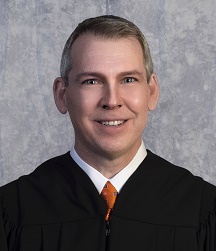Honorable Terry Nestor
Hamilton County Courthouse
1000 Main Street
Room 540
Cincinnati, Ohio 45202
Cheryl Vest, Bailiff
Phone Number: 513-946-5790
Michael Brooks, Law Clerk
mbrooks@cms.hamilton-co.org
Phone Number: 513-946-5791
Fax Number: 513-946-5792
Plea Forms
COURTROOM PROCEDURES
CASE MANAGEMENT
In criminal cases, scheduling is done through the bailiff.
In civil cases, a trial schedule will be set at the initial case management conference ("CMC"). Counsel shall comply with Civil Rule 26(F), and shall file a joint plan prior to the CMC. A copy of the joint plan should be emailed to the law clerk. Click here to open Civil Rule 26(F) Form. If the Rule 26 plan has been submitted as required, the parties may jointly agree to a telephone or zoom CMC by contacting the law clerk. If the parties do not agree to a remote CMC, then counsel for the parties shall conduct the CMC by telephone. Counsel or the parties may contact the law clerk to indicate their preference at: mbrooks@cms.hamilton-co.org.
If parties desire an extension of the deadlines set in the case management conference, it must be done via written motion.
MOTION PRACTICE
A courtesy copy of dispositive motions, along with a Word-formatted proposed Entry, must be emailed to mbrooks@cms.hamilton-co.org
The case caption should be included in the email’s subject line.
The timelines for responses to and replies in support of motions will follow those imposed by the Ohio Rules of Civil Procedure and any applicable local rule.
Counsel should be familiar with the Local Rules.
The Court will set hearings for motions on a case-by-case basis, either sua sponte or at the request of a party. Motion hearing exhibits must be provided to the opposing party and the Court. To request the status of a pending motion or to alert the court of an urgent request, counsel should contact either the bailiff (criminal cases) or the law clerk (civil cases).
SETTLEMENT
If requested by both parties, the Court will become involved in the settlement of both civil and criminal cases.
CIVIL PRETRIAL CONFERENCE
During the initial case management conference, a pretrial conference will be set approximately two weeks prior to trial.
Pretrial statements are due at least three business days before the pretrial conference. Pretrial statements should follow the format in the Local Rules.
Motions in limine should be filed before the pretrial.
All exhibits, marked with exhibit numbers/letters, should be submitted to the Court at least three business days before the trial.
Counsel must prepare complete proposed jury instructions and submit them to mbrooks@cms.hamilton-co.org in Word format prior to the pretrial conference.
TRIAL
Trials will commence at 10am and continue until approximately 4pm, with a one-hour lunch and occasional recesses.
There is no time limit for voir dire, but counsel is expected to keep voir dire direct.
DISCOVERY
Discovery time limits are set at the initial case management conference. The Court expects opposing parties to be courteous and respectful regarding discovery. If a discovery dispute arises, parties must attempt to work it out before seeking Court involvement. The Court generally discourages discovery motions and expects counsel to resolve discovery issues short of court intervention. The Court will not intervene after the passing of a discovery deadline.
COURTROOM ETIQUETTE
Counsel and parties are expected to be professional, respectful, and courteous at all times. When speaking during a hearing or trial, counsel should stand, either at the podium or at their table. Counsel should ask permission before approaching a witness or the bench, but consider such permission continuing after the first request unless otherwise directed from the bench.
EXPECTATIONS/COMMENTS
I expect counsel to behave professionally and to act with civility toward each other, parties, witnesses, and my courtroom staff.
I expect counsel to be on time. If counsel is delayed or late, they should call the bailiff (criminal cases) or the law clerk (civil cases).

